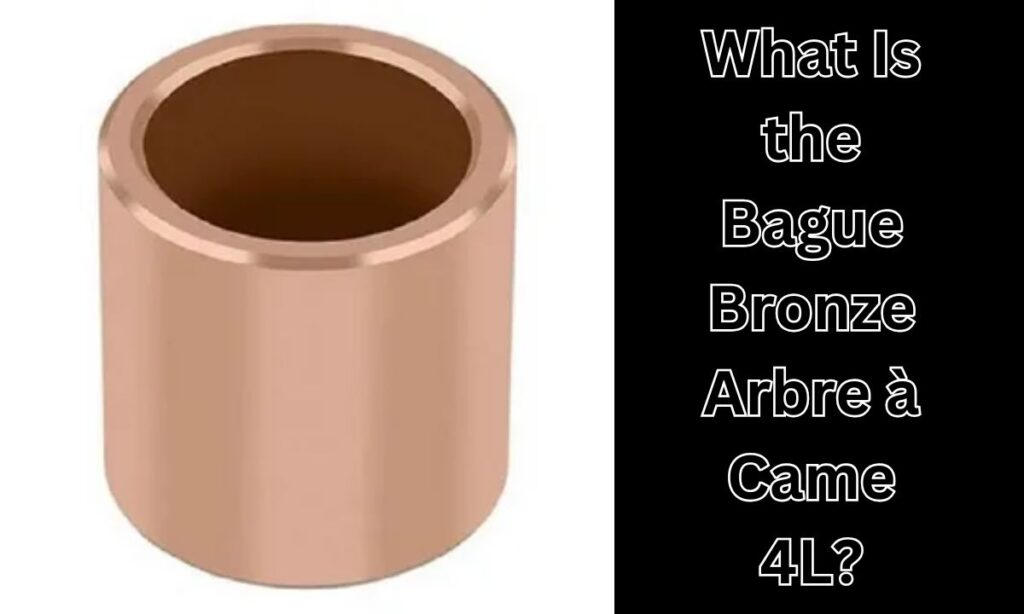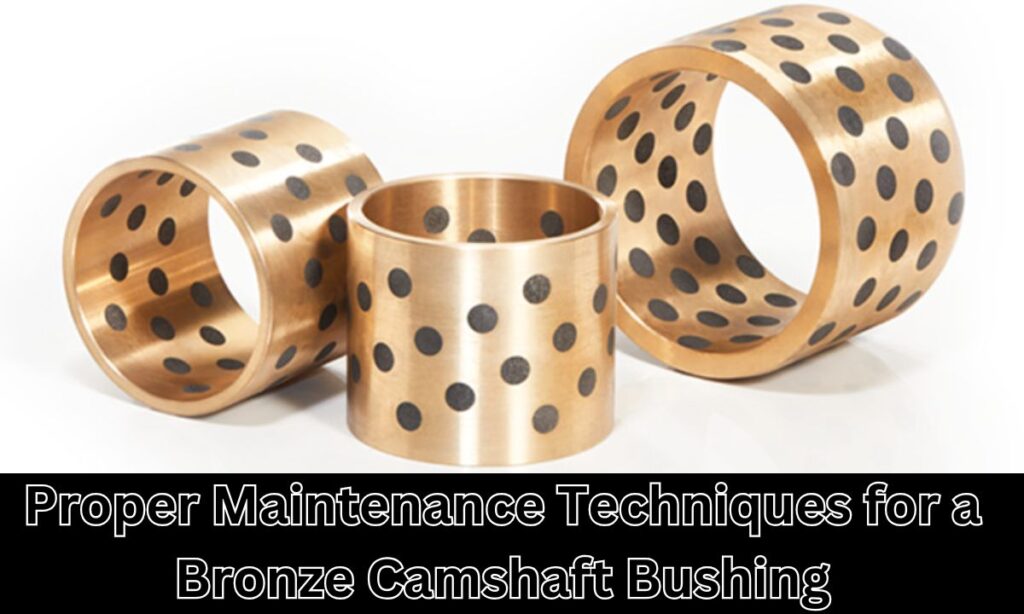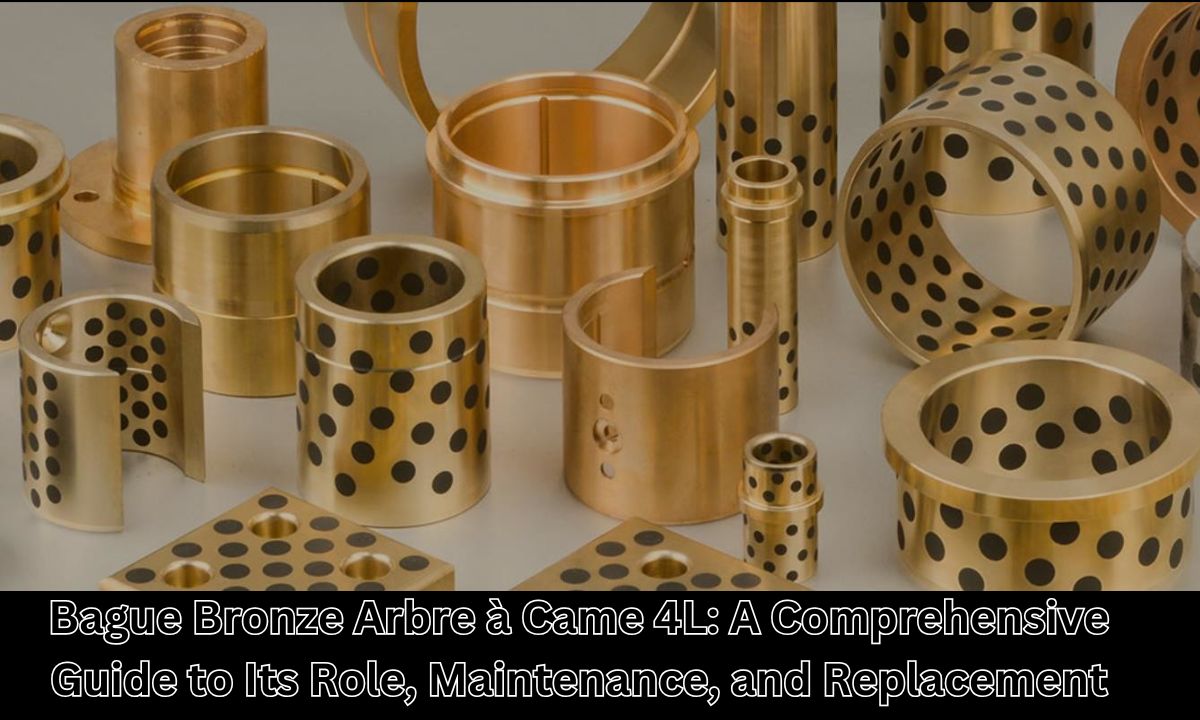The Renault 4L represents an iconic piece of French automotive engineering. At the heart of its mechanical complexity lies a critical component: the bague bronze arbre à came 4L.
This small yet powerful bronze camshaft bushing plays a pivotal role in ensuring the smooth operation of the vehicle’s engine. Our comprehensive guide will explore every nuanced aspect of this essential mechanical element.
What Is the Bague Bronze Arbre à Came 4L?

The bague bronze arbre à came 4L is a precision-engineered cylindrical bushing crafted from high-quality bronze material.
Its primary function centers on supporting and precisely aligning the camshaft within the engine block. Engineers specifically designed this component to withstand extreme mechanical stresses while maintaining optimal engine performance.
Bronze offers exceptional durability and heat resistance, making it the ideal material for this critical engine component.
Importance of the Bague Bronze Arbre à Came 4L
The critical importance of this camshaft bushing cannot be overstated for the Renault 4L’s engine system. It serves as a fundamental element that ensures mechanical precision and long-term reliability.
Proper functioning of the bague bronze arbre à came 4L directly impacts valve timing, engine smoothness, and overall mechanical efficiency.
Its role in managing thermal expansion and maintaining precise alignment makes it indispensable for preserving the vehicle’s mechanical integrity.
Signs That the Bague Bronze Arbre à Came 4L Needs Replacement
Mechanical wear manifests through several distinctive indicators. Unusual engine noises represent the first warning sign of potential bushing deterioration.
Oil leaks around the camshaft area indicate potential bushing failure. Visual inspections might reveal physical damage such as cracks, warping, or excessive wear.
Experienced mechanics understand these symptoms as critical signals requiring immediate attention. Ignoring these warning signs can lead to extensive and costly engine damage.
How to Replace the Bague Bronze Arbre à Came 4L?
Step 1: Tools and Preparation
Successful replacement requires specialized tools and meticulous preparation. Socket wrench sets, bushing removal tools, and precise installation equipment are essential.
Mechanics must ensure a clean, well-lit workspace with sufficient room for comprehensive engine access.
Step 2: Access the Camshaft
Accessing the camshaft demands careful disassembly. Removing the valve cover, timing belt, and surrounding components provides the necessary mechanical clearance.
Step 3: Remove the Old Bushing
Extraction of the worn bushing requires specialized removal tools. Careful manipulation prevents damage to the surrounding engine block. Mechanics must apply consistent, controlled pressure to ensure clean removal.
Step 4: Install the New Bushing
Light lubrication of the new bushing ensures smooth installation. Precise alignment represents a critical factor in successful replacement.
Installation tools help maintain proper positioning and prevent potential misalignment.
Step 5: Reassemble the Engine
Reassembly requires methodical attention to manufacturer specifications. Each component must be carefully reinstalled and properly torqued.
Timing belt alignment demands particular precision to prevent potential mechanical issues.
Step 6: Test the Engine
Final testing involves starting the engine and listening for smooth operation. Any unusual sounds or vibrations indicate potential installation issues requiring immediate professional attention.
READ THIS BLOG: Jennifer Hageney: All You Need to Know About Andrew Shue’s Family Life
Understanding the Role of the Bronze Camshaft Bushing in a 4L Engine
The bronze camshaft bushing is a precision mechanical component that:
- Supports camshaft alignment
- Reduces friction between moving parts
- Manages thermal expansion
- Ensures consistent engine lubrication
- Prevents premature mechanical wear
- Maintains valve timing accuracy
- Supports overall engine performance
Proper Maintenance Techniques for a Bronze Camshaft Bushing

Maintenance techniques include:
- Regular engine oil changes
- Periodic visual inspections
- Checking for unusual engine noises
- Monitoring performance indicators
- Using high-quality lubricants
- Avoiding extreme temperature variations
- Professional periodic engine evaluations
- Replacing when signs of wear appear
Step-by-Step Guide to Replacing a Bronze Camshaft Bushing in Your 4L
Replacement process involves:
- Gathering specialized tools
- Disconnecting battery
- Removing valve cover
- Extracting timing belt
- Carefully removing old bushing
- Cleaning mounting surface
- Lubricating new bushing
- Precise alignment during installation
- Reassembling engine components
- Conducting performance tests
- Verifying proper mechanical operation
Maintenance Tips for the Bague Bronze Arbre à Came 4L
Regular maintenance extends the lifespan of the camshaft bushing. Consistent oil changes provide critical lubrication and minimize mechanical wear.
Routine inspections allow early detection of potential issues before they escalate into significant problems.
Quality replacement parts ensure continued reliable performance. Genuine manufacturer-recommended components maintain the Renault 4L’s original mechanical specifications.
Frequently Asked Questions
How Often Should the Bague Bronze Arbre à Came 4L Be Replaced?
Replacement depends on usage and maintenance. Typically, every 50,000 to 75,000 kilometers or during major engine servicing.
Can I Replace the Bushing Myself?
Advanced mechanical skills are required. Professional assistance is recommended for precise installation.
What Happens If I Ignore Bushing Wear?
Continued use can lead to significant engine damage, potentially requiring complete engine reconstruction.
Are Original Replacement Parts Important?
Genuine parts ensure optimal performance and maintain the vehicle’s mechanical integrity.
How Do I Identify Potential Bushing Wear?
Listen for unusual engine noises, monitor performance changes, and conduct regular visual inspections.
Conclusion
The bague bronze arbre à came 4L represents more than a simple mechanical component. It embodies the engineering excellence of the Renault 4L, ensuring smooth, reliable performance. Understanding its function, recognizing wear signs, and maintaining it properly preserves this classic vehicle’s mechanical heritage.
Renault 4L owners must approach this component with respect and attention. Professional guidance, quality parts, and consistent maintenance guarantee the continued reliability of this iconic automobile. The camshaft bushing stands as a testament to precision engineering and mechanical craftsmanship.

smith is a seasoned SEO expert with a passion for content writing, keyword research, and web development. He combines technical expertise with creative strategies to deliver exceptional digital solutions.










